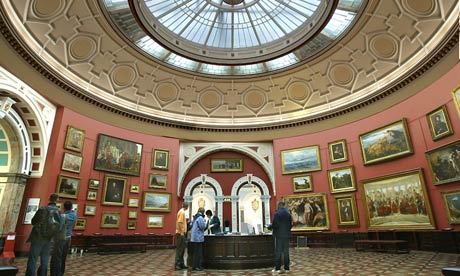Jobs In Art Galleries Definition
Source Link (google)Job In Art Galleries is a manager or overseer. Traditionally, a curator or keeper of a cultural heritage institution (e.g., gallery, museum, library or archive) is a content specialist responsible for an institution's collections and involved with the interpretation of heritage material. The object of a traditional curator's concern necessarily involves tangible objects of some sort, whether it be artwork, collectibles, historic items or scientific collections. More recently, new kinds of curators are emerging: curators of digital data objects and biocurators.In smaller organizations, a curator may have sole responsibility for the acquisition and care of objects. The curator will make decisions regarding what objects to take, oversee their potential and documentations, conduct research based on the collection and history that provides propered packaging of art for transportation, and share that research with the public and community through exhibitions and publications. In very small volunteer-based museums, such as local historical societies, a curator may be the only paid staff member.In larger institutions, job in art galleries primary function is as a subject specialist, with the expectation that he or she will conduct original research on objects and guide the organization in its collecting. Such institutions can have multiple curators, each assigned to a specific collecting area (e.g. Curator of Ancient Art, Curator of Prints and Drawings, etc.) and often operating under the direction of a head curator. In such organizations, the physical care of the collection may be overseen by museum collections managers or museum conservators, and documentation and administrative matters (such as insurance and loans) are handled by a museum registrar.In the United Kingdom, the term curator is also applied to government employees who monitor the quality of contract archaeological work under Planning Policy Guidance 16: Archaeology and Planning (PPG 16) and are considered to manage the cultural resource of a region. In the museum setting, a curator in the United Kingdom may also be called a "keeper".In Scotland, the term "curator" is used to mean the guardian of a child.In the United States, the term can also be used to refer to a member of the University of Missouri Board of Curators, the governing body of the University of Missouri System. The Board consists of nine members appointed by the state governor.More recently, advances in new technologies have led to a further widening of the role of curator. This has been focused in major art institutions internationally and has become an object of academic study and research.In contemporary art, the title curator is given to a person who selects and often interprets works of art. In addition to selecting works, the curator often is responsible for writing labels, catalog essays, and other supporting content for the exhibition. Such curators may be permanent staff members, be "guest curators" from an affiliated organization or university, or be "freelance curators" working on a consultant basis. The late twentieth century saw an explosion of artists organizing exhibitions. The artist-curator has a long tradition of influence. Notable among these was Sir Joshua Reynolds, founder of the Royal Academy, London.In some American organizations, the term curator is also used to designate the head of any given division of a cultural organization. This has led to the proliferation of titles such as "Curator of Education" and "Curator of Exhibitions". The term "literary curator" has been used to describe persons who work in the field of poetry, such as former 92nd Street Y poetry director Karl Kirchwey.[1] This trend has increasingly been mirrored in the United Kingdom in such institutions as Ikon, Birmingham, UK and Baltic, Gateshead, UK.In Australia and New Zealand, the term is also applied to a person who prepares a sports ground for use (especially a cricket ground)[2] This job is equivalent to that of groundsman in some other cricketing nations.In France, the term curator is translated as conservateur. There are two kind of curators, Heritage curators (conservateurs du patrimoine) with five specialities (archeology, archives, museums, historical monuments, natural science museums), and Librarian curators (conservateurs des bibliothèques). These curators are in public service, selected by competitive exam, the use of the title curator by private workers remains unofficial.










No comments:
Post a Comment